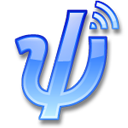
A bulletin board system (BBS), also called a computer bulletin board service (CBBS), was a computer server running software that allowed users to connect to the system using a terminal program. Once logged in, the user can perform functions such as uploading and downloading software and data, reading news and bulletins, and exchanging messages with other users through public message boards and sometimes via direct chatting. In the early 1980s, message networks such as FidoNet were developed to provide services such as NetMail, which is similar to internet-based email.

In computing, a plug-in is a software component that adds a specific feature to an existing computer program. When a program supports plug-ins, it enables customization.
Shareware is a type of proprietary software that is initially shared by the owner for trial use at little or no cost. Often the software has limited functionality or incomplete documentation until the user sends payment to the software developer. Shareware is often offered as a download from a website. Shareware differs from freeware, which is fully-featured software distributed at no cost to the user but without source code being made available; and free and open-source software, in which the source code is freely available for anyone to inspect and alter.

Pidgin is a free and open-source multi-platform instant messaging client, based on a library named libpurple that has support for many instant messaging protocols, allowing the user to simultaneously log in to various services from a single application, with a single interface for both popular and obsolete protocols, thus avoiding the hassle of having to deal with new software for each device and protocol.

Yahoo! Messenger was an advertisement-supported instant messaging client and associated protocol provided by Yahoo!. Yahoo! Messenger was provided free of charge and could be downloaded and used with a generic "Yahoo ID" which also allowed access to other Yahoo! services, such as Yahoo! Mail. The service also offered VoIP, file transfers, webcam hosting, a text messaging service, and chat rooms in various categories.

WinMX is a freeware peer-to-peer file sharing program authored in 2000 by Kevin Hearn in Windsor, Ontario (Canada). According to one study, it was the number one source for online music in 2005 with an estimated 2.1 million users. Frontcode Technologies itself abandoned development of WinMX in September 2005, but developers brought the service back online within a few days by releasing patches. WinMX continues to be used by a community of enthusiasts.

Miranda NG is an open-source multiprotocol instant messaging application, designed for Microsoft Windows. Miranda NG is free software distributed under the GNU GPL-2.0-or-later.

Virtual Network Computing (VNC) is a graphical desktop-sharing system that uses the Remote Frame Buffer protocol (RFB) to remotely control another computer. It transmits the keyboard and mouse input from one computer to another, relaying the graphical-screen updates, over a network.
Tencent QQ, also known as QQ, is an instant messaging software service and web portal developed by the Chinese technology company Tencent. QQ offers services that provide online social games, music, shopping, microblogging, movies, and group and voice chat software. As of March 2023, there were 597 million monthly active QQ accounts.

Psi is a free instant messaging client for the XMPP protocol which uses the Qt toolkit. It runs on Linux, Windows, macOS and OS/2.
ISCABBS, also known as ISCA, is a bulletin board system ("BBS"), formerly based at the University of Iowa. Dave's own version of Citadel, an early branch of the Citadel/UX BBS software, was developed to run ISCA. Like most Citadels, the focus is almost entirely on conversation among users.

Google Talk was an instant messaging service that provided both text and voice communication. The instant messaging service was variously referred to colloquially as Gchat, Gtalk, or Gmessage among its users.

Xfire was a proprietary freeware instant messaging service for gamers that also served as a game server browser with various other features. It was available for Microsoft Windows.
cc:Mail is a discontinued store-and-forward LAN-based email system originally developed on Microsoft's MS-DOS platform by Concentric Systems, Inc. in the 1980s. The company, founded by Robert Plummer, Hubert Lipinski, and Michael Palmer, later changed its name to PCC Systems, Inc., and then to cc:Mail, Inc. At the height of its popularity, cc:Mail had about 14 million users, and won various awards for being the top email software package of the mid-1990s.
Amiga software is computer software engineered to run on the Amiga personal computer. Amiga software covers many applications, including productivity, digital art, games, commercial, freeware and hobbyist products. The market was active in the late 1980s and early 1990s but then dwindled. Most Amiga products were originally created directly for the Amiga computer, and were not ported from other platforms.

GB-PVR was a PVR application, running on Microsoft Windows, whose main function was scheduling TV recordings and playing back live TV. GB-PVR is no longer under active development and has been superseded by NextPVR, also known as nPVR.
GT Power is a bulletin board system (BBS) and dial-up telecommunications/terminal application for MS-DOS. It was first introduced in the 1980s by P & M Software, founded by Paul Meiners. GT Power can be used both to host a BBS as well as to connect to other BBS systems via its full-featured dial-up "terminal mode". GT Power was a shareware package that required a registration fee in order to access its proprietary network mail transport/handling software and, by default, the GT Power Network. The software is distributed in two "flavors": a terminal-only version, nicknamed GTO, and the full-featured host and terminal version.
Monochrome BBS, known to users as "Mono," is a text-based multi-user bulletin board system featuring thousands of discussion files, along with games, user messaging, and a talker. As of November 2023 it is one of the few BBS's still in operation and actively used on a daily basis by its community. Monochrome runs on custom software, making the platform and user experience distinct from other bulletin board systems.

aMSN was a free Windows Live Messenger clone. aMSN attempted to emulate the look and feel of Windows Live Messenger, and supported many of its features. It had been downloaded approximately 40 million times as of January 2011, making it the 21st most downloaded project on SourceForge.








